The Unlikely Gift Of Breast Cancer with Diane Simard
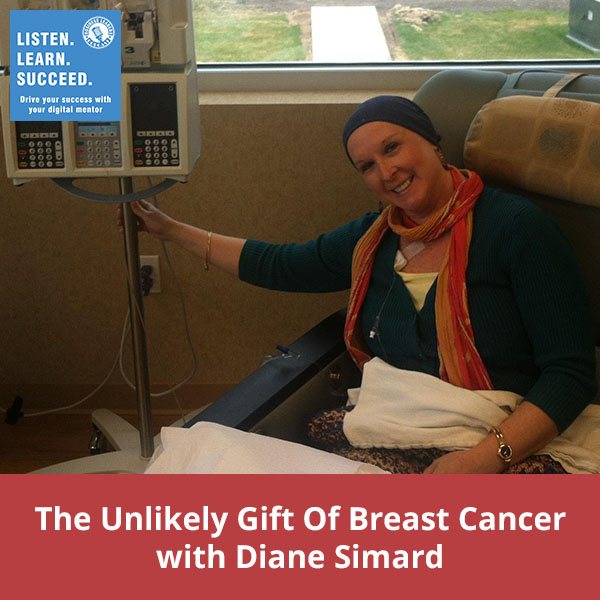
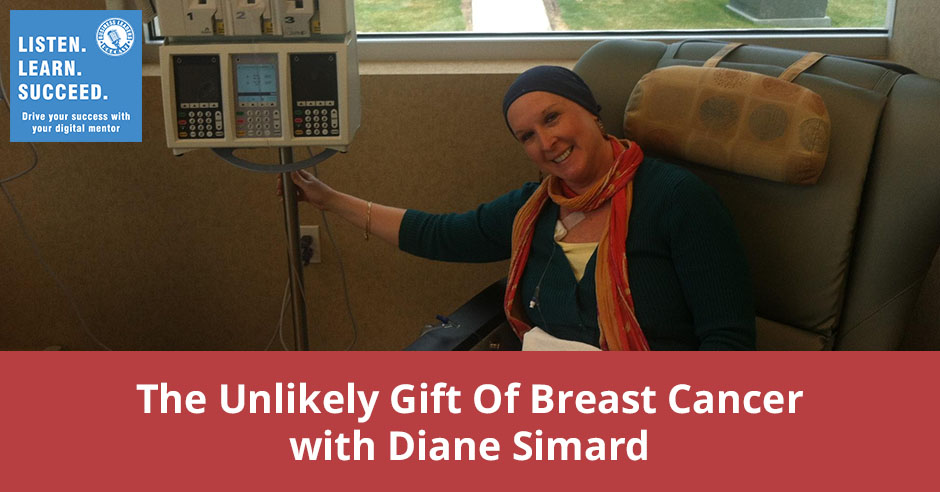
Women who are newly diagnosed with breast cancer are shocked at how emotional the experience is. They’re finding that their emotions range from extremes as everything seems to all of a sudden get amplified in their life. Diane Simard, author of The Unlikely Gift of Breast Cancer, goes into her own personal experience of going through and surviving Stage 3 breast cancer. She’s here to talk about her book, the diagnosis, her treatments, and her advocacy for individualized psychosocial support for cancer survivors and their caregivers.
—
The Unlikely Gift Of Breast Cancer with Diane Simard
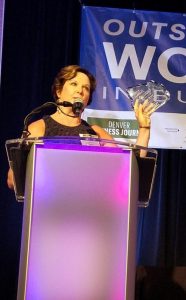 I’m Diane M. Simard coming to you from Bye Aerospace in lovely Centennial, Colorado. I’m thrilled to be on the show as part of a follow on. I’m here to talk about my experience now that I’ve published a book that I wrote called The Unlikely Gift of Breast Cancer. I’m here to talk about how much fun I’m having integrating my life as an author and also my life as a Senior Vice President and Board Member for this amazing company that’s developing what we believe will be the world’s first FAA Part 23 certified airplane called eFlyer. We’re targeting the flight training market. What I’m finding out is that my book, which I finished and published, is appealing to two different sets of folks. One is newly diagnosed women with breast cancer who are shocked at how emotional this experience is. They’re finding that their emotions range from extremes and as I always say, “Everything seems to all of a sudden get amplified in your life.” Your highs are higher, your lows are lower. What this book does is go into my personal experience. It’s not a self-help book or “Do this, don’t do that” book. It’s the story about my experience, how I felt these same emotions and what I did about it.
I’m Diane M. Simard coming to you from Bye Aerospace in lovely Centennial, Colorado. I’m thrilled to be on the show as part of a follow on. I’m here to talk about my experience now that I’ve published a book that I wrote called The Unlikely Gift of Breast Cancer. I’m here to talk about how much fun I’m having integrating my life as an author and also my life as a Senior Vice President and Board Member for this amazing company that’s developing what we believe will be the world’s first FAA Part 23 certified airplane called eFlyer. We’re targeting the flight training market. What I’m finding out is that my book, which I finished and published, is appealing to two different sets of folks. One is newly diagnosed women with breast cancer who are shocked at how emotional this experience is. They’re finding that their emotions range from extremes and as I always say, “Everything seems to all of a sudden get amplified in your life.” Your highs are higher, your lows are lower. What this book does is go into my personal experience. It’s not a self-help book or “Do this, don’t do that” book. It’s the story about my experience, how I felt these same emotions and what I did about it.
Secondly, the other group that is finding this book appealing are those who are either survivors themselves or caregivers to survivors who wonder what this experience is like. One thing that I did is I set out to capture what it tastes, feels and smells like to go through what I call the nuclear bomb treatment, which includes chemo, surgery and radiation. It’s a very vivid recap of what I experienced, how I reacted, how I responded and what I did about it. I happen to find that journaling was very soothing for me. That journal is what turned into this story that I just published.
—
Diane, thank you so much for sitting down again. This is our second time. For many, if not all, we all have cancer somewhere in our families. It’s been in my family. We had a friend that got re-diagnosed here. The journey continues. What I thought was most important about this is that you had the courage and foresight to write the book, put yourself out there and push yourself at risk. At the same time, you’re very busy with Bye Aerospace and life goes on. I wanted to make sure we did this and why in this show? The cancer for you was during your business career. There are many different business owners that have either themselves or loved ones or people in their business that are diagnosed with cancer. I thought it was important to go back to this again. We’re going to talk about the book. Some of the things that maybe people don’t think would be what they would think is an outcome. For the book, diagnosis, treatment and advocacy, let’s talk about that.
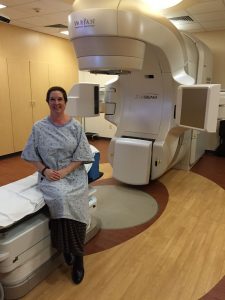 Writing the book was part of my healing process and continues to be. I journaled. I couldn’t find anyone to talk to and I asked my oncologist for a therapist that I could meet with one-on-one who understood what it’s like for a Type-A business executive for myself, who very much needs to think she’s in control to go through this process. Statistically, we knew the outcome likely was that it was going to be treatable and go into remission, which thankfully it did. However, I was more concerned because I think in terms of I would say a chess player. I’m often thinking five years, ten years out. I was concerned about how this traumatic experience was going to impact me psychologically over the long-term. It was when I asked my oncologist for a referral to a therapist and she didn’t know of anybody, but she recommended group therapy, which I’m not a group therapy person. Then I started digging into why there’s a lack of practitioners. As it turns out, there are therapists who do see cancer patients.
Writing the book was part of my healing process and continues to be. I journaled. I couldn’t find anyone to talk to and I asked my oncologist for a therapist that I could meet with one-on-one who understood what it’s like for a Type-A business executive for myself, who very much needs to think she’s in control to go through this process. Statistically, we knew the outcome likely was that it was going to be treatable and go into remission, which thankfully it did. However, I was more concerned because I think in terms of I would say a chess player. I’m often thinking five years, ten years out. I was concerned about how this traumatic experience was going to impact me psychologically over the long-term. It was when I asked my oncologist for a referral to a therapist and she didn’t know of anybody, but she recommended group therapy, which I’m not a group therapy person. Then I started digging into why there’s a lack of practitioners. As it turns out, there are therapists who do see cancer patients.
The key is though that most of them get their training either at the post-doc level or on this side. It’s very specialized. I found that no one at any university in this country was offering oncology psychology training at the graduate level while they’re still in school. Because of my business background, I saw this as an opportunity if I seed funded and launched this specialty. It’s called the Center for Oncology Psychology Excellence or COPE and it’s at the University of Denver. It would start to bring attention to the importance of how big of a gap there is in our healthcare system. It’s not just cancer, but other traumatic health experiences that were not paying any attention really to the individual experience. My cancer experience is likely different than other breast cancer patients because of my body chemistry, my background, how I deal with stress and trauma. I hope that all of this attention that the book is bringing in that I’m trying to do during my advocacy brings more attention to the importance and the long-term impact psychologically of such a traumatic health experience.
How long has COPE been in place at the University of Denver?
It’s two and a half years old. It was launched in February of 2016 about three months after I finished my formal treatment. The first classes were offered in the fall of 2016. I’m so pleased that since COPE was launched that 64 students have either taken some or all of the COPE classes. There are four classes in the COPE offering. In addition to a classroom component, there are clinical components because these are clinical psychologists, the psychologists that will see patients as opposed to research psychologists that are doing the research work. It’s the COPE Clinic aspect to it. In its first year alone, the COPE students provided over 7,000 hours of assistance to cancer patients, survivors and their caregivers at the COPE Clinic.
You should be grateful and happy that you’re alive.
I think about the math of the hours. There’s the concept of the class when it first was launched and what the student’s going through and getting the feedback from the crowd, for lack of a better term. What did you see on the evolution of COPE from ’16 to ’17 to now?
There’s quite a demand for it. Because of the work that’s being done to start to try to rid at least our culture of that stigma of you have a mental health problem, that the brain is part of the body. Sometimes the brain gets impacted because of traumatic experience, war experience, cancer, divorce, death and that your brain can start to not function again as it should. It is the early efforts to bring more attention to the fact that you’re not a horrible person. You’re not purposely trying to do these things. Your mind is just not working properly. The early results are that several survivors have reached out to me to say, “I’m a three-year, five-year survivor. I am having PTSD nightmares like you wouldn’t believe.” People respond to me this way too is that, “You’re a survivor. You’ve survived cancer. Your cancer is in remission. You should be grateful and happy that you’re alive.”
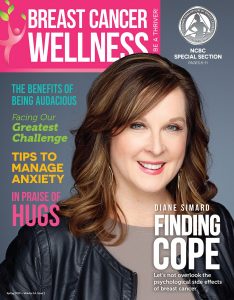 What happens is that you have these emotional triggers. An emotional trigger could be a certain smell. For me, it’s a piece of plastic Tupperware in our cupboard that when I was going through chemo and barfing up a lung every other week, some friends gave us some frozen meatballs in this piece of Tupperware. I see that in the cupboard and I get nauseous. It’s a trigger and I’m very interested in the research aspect of this too. There was one study done a couple of years ago and the cohort of the group of survivors of all types of cancer that were studied. It was about a group of about 500 survivors. At the six-month mark, after their treatment ended, 21% of this group was diagnosed with PTSD. It appears that the PTSD symptoms spike at the six to twelve-month post treatment mark. At the four-year mark post-treatment, that PTSD percentage is going back down to the national average, which is about 6.8% of those citizens in our country that are experiencing PTSD from whatever trigger or reason at any given time.
What happens is that you have these emotional triggers. An emotional trigger could be a certain smell. For me, it’s a piece of plastic Tupperware in our cupboard that when I was going through chemo and barfing up a lung every other week, some friends gave us some frozen meatballs in this piece of Tupperware. I see that in the cupboard and I get nauseous. It’s a trigger and I’m very interested in the research aspect of this too. There was one study done a couple of years ago and the cohort of the group of survivors of all types of cancer that were studied. It was about a group of about 500 survivors. At the six-month mark, after their treatment ended, 21% of this group was diagnosed with PTSD. It appears that the PTSD symptoms spike at the six to twelve-month post treatment mark. At the four-year mark post-treatment, that PTSD percentage is going back down to the national average, which is about 6.8% of those citizens in our country that are experiencing PTSD from whatever trigger or reason at any given time.
I think about the folks that are reading and they’re going, “All she’s missing is a cape with a big S,” and you think about that. The folks that are thinking about this, how did you get the book done and work full-time too?
In Bye Aerospace, this is our twelfth year. I’ve been an employee and I’m very interested in what we’re doing and an investor from almost the very beginning. We certainly had our lean years as any company does. This launched right before the recession of 2008 started. I worked through treatment and it lasted ten months. I worked as much as I could, which was on average about half to three-quarters of the time. My business partner, George Bye, was so wonderful about allowing me to have the time that I needed to be home trying to recover. You’ve said it before, they do their best to try to kill you during this treatment process. As I was coming out of treatment, getting my energy back and rediscovering who I was, I found that spending 30 to 60 minutes at my home office writing every morning was a key part of my recovery.
It was that therapy. It was capturing. It was how this came about was that I ended up writing the first manuscript for this book exactly a year after it happened. I remember one morning when I was working on the chapter about my first chemotherapy infusion. As I was writing that exactly a year later, I had to run to the bathroom and thought I was going to be sick. That’s the point of how powerful this is and how your mind is so vivid still. I think personally for me, forcing myself to relive it, but to do something about it, to have a life raft called a book, a Project COPE. Something to say, “We can do better at this treatment process,” and to grab onto something and to be able again to integrate is that part of my life. The advocacy work with which what we’re doing here, which is revolutionizing general aviation. Showing that it can be done as electric cars have over the last decade come into their own and we’re seeing efficiencies. We’ve got kinks that have got to get worked out.
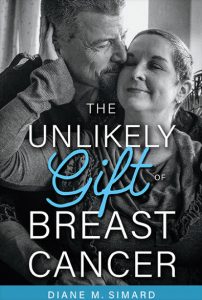 The Unlikely Gift of Breast Cancer
The Unlikely Gift of Breast Cancer
The point is that this is doable. The battery energy densities are improving. All the goodness is there. We’re integrating all of that together. Much like I’m integrating my post-cancer advocacy work, which is still important for me to continue, to be positive about this. That’s why I titled the book the way that I did, The Unlikely Gift of Breast Cancer. I learned so much about myself, my upbringing, why am who I am? Having been trained as a journalist and now having the chance to finally have my own voice as opposed to being a business writer my whole life and writing everybody else’s speeches and press releases. The doors have opened for me and I’m so grateful that others are responding to the fact that this can be an experience of self-discovery and transformation.
It’s not a desired sorority or fraternity to be a post-cancer survivor. The thing that I was thinking about as you were talking is as you’re innovating, advancing, reflecting and doing what you do in the business world, you have a long history of being successful in the business world. You think about how in the world do you take this particular horrific experience? I remember you were talking about the red, whatever it was that they gave you. Your comment was, “If it spills outside of the injection site, it’ll burn your skin.” All I could think of is, “What’s it doing on the insides?” I think about how to turn this around and create something to help others. I read the book. The part that sticks in my mind the most is when you were driving your car and yelling away.
It’s like the arc of the book. What you are describing is I’m about halfway through chemo, sick as a dog, trying to slug through life and praying that I’m going to survive treatment. I had never gotten angry. I had come from lunch with a dear friend. All we talked about was cancer. As I went on and on about it, I wouldn’t shut up about cancer. I made this comment, “I’m so sick of talking about cancer. This cancer cloud follows me everywhere.” She interrupted me and she said, “Diane, you start living your life again as though you don’t have cancer.” It was brilliant. That was the moment when I realized I can make a choice whether or not I let cancer define me. I decided I didn’t want to be defined as the cancer survivor first and foremost.
What I wanted this to be is an illustration of how something so traumatic can be turned around, turned on its head and to say, “I can be challenged.” I certainly found out the depth of my strength and ability to bounce back, but I was determined to say, “This is going to change me.” For some reasons, people are interested in because by this time I was starting to send out updates about what this was like. Many of our friends were responding to the details that I was describing that. They’re like, “No one ever wants to talk about cancer.” I’ve always had these questions. I’m like, “Ask me anything.” It’s okay to talk about it or not talk about it. It’s whatever is in here that feels right for you. I often call myself an enigma because I have all these contrasts in my life. I’m a control freak. I look at things differently. I look at challenges as an opportunity. I’m more interested in what people do to come back from adverse situations than what they did to make themselves successful or whatever.
You have to see the bad before you can appreciate the good.
In the book, there was one point where you said, “I decided to cut my hair off before it fell out.” You’re going like, “I’m going to exercise control where I can.” Sure enough, treatments and whatever remained fell out.
To use a business analogy, how many of us have been in business and you know the day’s going to come when you have to make some cuts? Cut staff and cut expenses. My experience has been that there are those CEOs and leaders who see this coming, hate it and wait to the absolute last moment when they’re barely hanging on by a thread before they do it. There are those that say, “All indicators are such that this isn’t going to get better. We’re going to have a plan for how we’re going to come back from this, but in order to do that, we need to make these changes right now.” You can certainly continue to pray and hope for a miracle.
It’s a pretty thin strategy.
What it does is it beefs up your plan. I’m going to be the one that takes the biggest cut or whatever that plan is. You show leadership. You show and you’d be proactive to say, “I don’t want to wait until the absolute last minute to watch my hair fall out in the shower.” I didn’t want that additional self-inflicted trauma because I knew that was going to take me over the edge. I had my hair cut off five days after my first chemo infusion because my hair felt brittle. It’s awful. It felt like I hadn’t washed all the shampoo out of it. My husband helped me. It was very liberating for about 24 hours until again those emotions came back into play. I went back to the office. I came here the next day and I was so nauseous. The color of the wallpaper made me sick. It was incredible. The reason for me is that the anti-nausea drugs are as I jokingly say, “Mind-bending drugs,” but it is working with your mind and trying to convince your body that you aren’t sick.
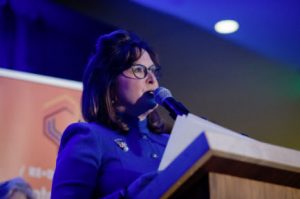 The red devil called Adriamycin, I’d equate it to a drain cleaner, is what it’s doing because it’s wiping out those unhealthy cancer cells but at the same time, it’s got to kill off the good cells. Why I lost a lot of weight during those four chemo infusions is that your body uses all the calories. It turns it into energy to rebuild the healthy cells that have been obliterated. The problem with me was that when I switched chemo drugs for the second half of chemo, I had that infusion every week. Those steroids that are so important to tolerating nausea and the side effects, then all of a sudden it’s grabbing all the water and all the fat you’re putting in and the opposite happens. I was putting on a pound a week. I’m still eating as healthy as I could and trying to exercise and it’s brutal. It could not be more frustrating and dehumanizing of a process.
The red devil called Adriamycin, I’d equate it to a drain cleaner, is what it’s doing because it’s wiping out those unhealthy cancer cells but at the same time, it’s got to kill off the good cells. Why I lost a lot of weight during those four chemo infusions is that your body uses all the calories. It turns it into energy to rebuild the healthy cells that have been obliterated. The problem with me was that when I switched chemo drugs for the second half of chemo, I had that infusion every week. Those steroids that are so important to tolerating nausea and the side effects, then all of a sudden it’s grabbing all the water and all the fat you’re putting in and the opposite happens. I was putting on a pound a week. I’m still eating as healthy as I could and trying to exercise and it’s brutal. It could not be more frustrating and dehumanizing of a process.
For many folks, they talk about the pivot point. The character is defined not so much about what you do when things are going well. Character truly is defined by when things are not going your way. I think about this and you’ve been through business challenges. You’ve been through the health challenge and so on. There are probably other business owners out there. I’ve had a few challenges I’d like to share my thoughts after success, after coming back from the challenge. What advice would you offer to that business owner that’s out there thinking about writing a book?
For me as far as finishing a project like this, it was so cathartic. This was a very spiritual experience, a spiritual awakening. I had already had it with organized religion. I kept having these thoughts calling God moments or whatever, but it became so important. My friends and those who knew me gave me such affirmation to say, “We want to read about what it is that this experience is like.” All the signs were there that I needed to do this. Trust me as a self-published author, you don’t this to make money. This is important. This is certainly the biggest project I’ve ever taken on, but I wasn’t going to be at peace with myself and be able to shut the door on this part of my life. This life-changing experience until I accomplished this, until I’ve finished this and it took forever.
Like in business, it took two to three times as long as I thought it would. I didn’t have a budget. I’ve done all kinds of business writing proposals and press releases, but this is my story. I wanted to get it right. I did a lot of digging deep into family history as to what molded me. The father-daughter relationship is a key message throughout this. I’m at peace now because I discovered so much about myself and why I am who I am. I always thought my calling in my career was to be the number two gal, to be there, to put the words in the leader’s mouth to make him or her look good because I had thrived at that until I went through this. I realized I have my own voice. Some people seem interested in what it is that I have to say and I turned 50 in the midst of all of this. It was so symbolic that I’m so grateful now to be able to go back and look at all the crazy business experiences. The things that I’ve seen done right and wrong, to reflect on that and to bring those experiences into my memoir.
It’s an incredible coming together of everything that’s gotten me to this point. I’m now positioned to say, “We have this cool aerospace company. We’re revolutionizing general aviation and other things we can’t even talk about yet.” There’s this other advocacy part. I hope to have several more books in me. Working full-time, it’s tough to be your own publicist and I’m doing the best I can. I want to take my time. I tell you, if I tell future stories and publish future books, it’s not going to be a hundred things you need to do to be successful. I’m not interested in that. There’s plenty of people in self-help books and wonderfully published authors and books about how to do that. I want to go back and talk about what’s the worst day in your life, the lowest point of your career and how did you pull yourself up by the bootstraps and get out of that? I find those stories fascinating.
I always think about there was a point, there’s a place, there was a moment for many and you’ll go, “On this day, at this point, I decided.” It is common. I had this conversation with my daughter. I said, “You went through a whole bunch of stuff.” I said, “Tell me about your decision process. How did you decide and what you think about how you decide?” You have a good idea of what a crappy day looks like.
Being able to speak freely is so liberating.
That’s how my book starts. It starts on at the moment I was diagnosed and then what I processed for the next four or five hours. By the end of that day, that horrific day, I had a plan because that’s what business teaches you is to think methodically to say, “I could go spend the next three weeks wallowing in self-pity, drinking myself into oblivion or I can do what we do in business, which is not wallow in all this to say, “Here’s another unexpected.”
What am I going to do?
It’s bitter. I was not really angry but I couldn’t believe. I’m like, “I’m turning 50. Come on.” I’ve been through as an amateur Angel investor wanting to help other entrepreneurs develop their ideas. It’s been such a merry go round and the stories that go along with that. I couldn’t believe here I am facing what could possibly be the biggest challenge in my life at a time when I’m looking for peace.
There’s always this entitlement thought, “I’m a certain age. I’ve got a certain amount of whatever it is, mileage behind me. This shouldn’t be happening to me now.” I’ve heard this a lot and read about it some and you go, “What makes you special and why do you think it shouldn’t be you?” The short answer is you’ve got to put your boots on and get busy.
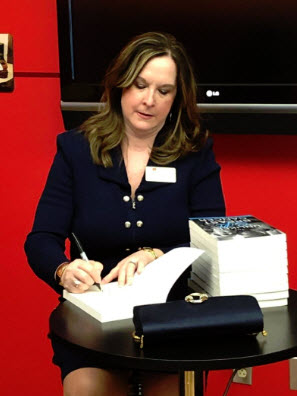 I have several moments like that throughout my story in the book. In fact, even through treatment as I was getting started with chemo, my husband and I would always bust up laughing because stuff happened to me that doesn’t normally happen. For example, I got sick the first time I switched chemo drugs and got started on the next phase of my chemotherapy, which is this evil wonder drug called Taxol. Thankfully, I was alone in the infusion room that day because I once again had been barfing up along for months being sick. I thought, “This drug is supposed to be less difficult on my stomach.” Because our healthcare system doesn’t have a test to see whether or not I’m allergic to Taxol, they give me a double shot of steroids beforehand. They do this pre-chemo drip.
I have several moments like that throughout my story in the book. In fact, even through treatment as I was getting started with chemo, my husband and I would always bust up laughing because stuff happened to me that doesn’t normally happen. For example, I got sick the first time I switched chemo drugs and got started on the next phase of my chemotherapy, which is this evil wonder drug called Taxol. Thankfully, I was alone in the infusion room that day because I once again had been barfing up along for months being sick. I thought, “This drug is supposed to be less difficult on my stomach.” Because our healthcare system doesn’t have a test to see whether or not I’m allergic to Taxol, they give me a double shot of steroids beforehand. They do this pre-chemo drip.
I’m like, “I’m not sure. I have a really weak stomach. What’s the alternative?” “You could die if you’re allergic to Taxol.” I go, “Once again, are you serious this is the best way we have is that we try this method?” I’m like, “Okay.” They gave me the double steroid. For the next hour while I’m having the Taxol infusion, I ended up not being allergic, thank God, but the double doses steroids, imagine you’re a dog and you’re chained to a post. That’s what it felt like because you have these leg twitches and these jolts of energy and you’re angry. I wanted to scream. I went through that for an hour. It was when they went to do my port flush. You have a port inserted under your skin. The last infusion of the day is saline to flush out your port so it doesn’t get infected. They hooked me up to the saline and then all of a sudden everything started to spin.
I told my husband, Rene, “Bring me a wastebasket.” I unleashed seven times. All the medical personnel came rushing in. They said, “That shouldn’t be happening.” I kept hearing that over and over because everything happens to me differently. I’m not normal. I said, “I don’t know what it was. It must have been the double dose of steroids.” They go, “You’re not allergic to Taxol. That’s good.” I said, “I don’t know. This made me sick. Can I go back to a single dose of steroids next time?” They’re like, “It depends on what the doctor says.” It ended up that I was able to do the single dose. Weird stuff happens to me and everybody’s reaction is you’re so different. People usually don’t respond in the way that you do. I go, “I think that’s my gift. That’s who I am in this world.” Call it abnormal or unique or different or whatever you do except that I live my life differently. I always have.
I think about the stories. I wrote a review on a book. I said, “It’s a first-person shooter view because you’re in the midst of doing what you do.” Being different and writing the book at the same time, so you’ve got the book, you’ve got the manuscript. You got the journaling. You and I talked on a previous podcast, you were still in the midst of titling and trying to bring it together. Now, we’re here. Now you’ve got some stuff going on with Bye Aerospace, FAA certification.
We’re in the queue. We’ve applied. The airplane program has to be much more mature. We have to have a whole bunch of tests, flight hours on the airplane. We believe we’re very early in the process. Talking about differentiators, what Bye Aerospace is doing very differently with electric airplanes, our electric airplane is we’re targeting a specific market. All of your business readers will likely appreciate this. There have been electric airplanes flying for some time. However, we’re targeting a specific market. We’re applying a business case to electric airplanes. Our business case is that we’re trying to help address the commercial pilot shortage, which is going to be chronic in twenty years. Regional airlines have already shut down because they don’t have enough pilots to staff. It requires 1,500 flight hours.
It’s a very expensive endeavor if you want to become commercial airline pilots. In fact, as much that as being a doctor or a lawyer believe it or not. We’re optimistic that because of the efficiencies and there are many efficiencies. The electric motors, Siemens is our electric motor partner. The battery energy densities are getting so much more improved that we believe by the time we achieve certification, which we’re projecting for 2021. The way this works is that as the batteries improve, the same airplane airframe is going to be able to fly longer and longer. It’s not like you have to completely retrofit the airplane to accommodate that. It’s putting a higher, denser battery.
Life is such a gift. It’s to be celebrated.
Flight schools are starting to realize, “This makes a lot of sense,” because they used to fly a Cessna 150 and 152 and the average age right now of the current training fleet is over 50 years old. The same year of an airplane that you flew back in the day is still in use. We’re hoping and optimistic that this will be a shot in the arm for this industry. To address this again as the world starts to rely more and more on flying people from Point A to Point B that will have the pilots because the military isn’t producing as many pilots in the past is for a whole host of reasons. The current average age of pilots for the commercial fleets, they’re getting older and older and they have a restricted retirement age.
They’re even talking about extending that to try to solve the problem. When you look at this journey, for the folks that are concerned, they’re in the workforce and are going, “What’s my employer going to think? Concurrently they’re going like, “I think generally it would be a good idea for me too. I’d like to produce a book as well.” You were supported on both sides, both from Bye Aerospace and George. They supported you in your book effort. Do you want to talk about it?
This is a very special company. Not everybody gets us and that’s okay. We like to think we do things differently, but loyalty is a big deal for us. Those of your readers who are entrepreneurs know, I wish we could all start business ventures completely well-funded up all the money you’re ever going to need. It likely never. I’ve been through much in my eleven years here. This was another part of life. This was another aspect, element dynamic to who I am as a person. The fact that I had such loving support here, understanding, and encouragement to express myself in this way. To finally for the first time, get out in front and to say, “I’m going to stop telling your story for this moment and I’m going to tell my own story not because I want the attention.” Apparently, this is an important part of my recovery and for me to be able to keep this in perspective by saying, “Here’s a small-town girl that went through this and here’s how she dealt with it.” She is grateful to have been given a second chance at life. I will always because I saw so many individuals curse with cancer who are not going to survive. It was important for me to be a witness to that. It was heartbreaking, but I believe you have to see the bad before you can appreciate the good.
I think about what I understand of your ethos. I learned, I share, I pass on. I think about for you, you’re back basically full-time in the south with Bye Aerospace. If you were to contrast the Diane before cancer at Bye and the Diane after cancer at Bye, what do you think the key differences are and what you bring to the table?
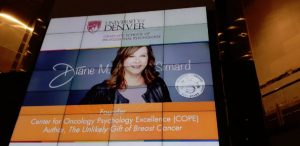 I joke that it’s because the estrogen is gone. If you’re in therapy, these drugs that shut off your estrogen permanently. It’s hormone therapy, not hormone replacement because they don’t want me to have estrogen because that’ll bring back cancer. My body thinks differently. I can’t hold back anymore. I’ve been known to do this with George like I’ll sit through a meeting. I’m fidgeting. I’m like, “I am going to unleash once this meeting is over.” I try to be respectful. I’m like, “George, I’m going to have a lack of estrogen moment here and I’m about to go off.” It’s not complaining. It’s like, “Here’s what’s happening.” I always try to offer a solution. I’m not a whiner about it, “Here’s what we can do differently. Let’s think about this in a different way.” I tell you, being able to speak freely is so liberating for me.
I joke that it’s because the estrogen is gone. If you’re in therapy, these drugs that shut off your estrogen permanently. It’s hormone therapy, not hormone replacement because they don’t want me to have estrogen because that’ll bring back cancer. My body thinks differently. I can’t hold back anymore. I’ve been known to do this with George like I’ll sit through a meeting. I’m fidgeting. I’m like, “I am going to unleash once this meeting is over.” I try to be respectful. I’m like, “George, I’m going to have a lack of estrogen moment here and I’m about to go off.” It’s not complaining. It’s like, “Here’s what’s happening.” I always try to offer a solution. I’m not a whiner about it, “Here’s what we can do differently. Let’s think about this in a different way.” I tell you, being able to speak freely is so liberating for me.
I was going to ask you in the pre-cancer versus post-cancer Diane, with this new-found candor or unleashed candor perhaps, how’s that make you feel?
It’s like a rebirth, to be honest with you. This is the real me. I was on Facebook corresponding with my cousins on my father’s side. Their beloved father was my favorite uncle. He was the life of the party. He always had jokes. When my uncle Frankie walked into the room, everybody got happy. It’s like, “Frankie is here. This is going to be fun.” I found out that I have this dry sense of humor of like, we have instant messaging here and I’ll read something and it’s funny. I’ll pull up a clip from a movie and I’ll send out an instant message in the midst of everybody’s day here and we all can hear us all laughing. That’s what I do. I just need to take 30 seconds here to have a laugh. I don’t take things nearly as seriously anymore.
I’m very passionate about being an author and helping other duly diagnosed cancer patients as a listener, not telling them. I listen, “What are you feeling?” I don’t know. Life is such a gift. It’s to be celebrated. I’m not here to tell you how smart I am. I don’t have all the answers. I find funny stuff that happens in everyday life. I combined that with caring and finding meaning. That’s who I am. I don’t have a top ten list for what you should do to be healthier, wealthier or successful. I have a need and a passion to help others to be available and to be a cheerleader almost.
With that being said, what’s going on with COPE now?
COPE is sustaining. It’s doing very well. When you have an entrepreneurial mind like mine that never stops, it’s not nearly enough. I’ve talked to several organizations and other universities about offering this same COPE format at other universities because pretty much it’s not a problem in Colorado. It’s everywhere. That’s how I think and I’ve tried to initiate some conversations. There’s some level of interest in emulating COPE. I don’t want to be getting credit for all this. Our healthcare system needs more evidence and statistical information to show that personally. I think that by offering more individualized mental health counseling while you’re going through and after this process and paying more attention to the caregivers. This is traumatic for them too, to say we’re going to look at you as a human being, not as Patient Number 57.
Look at challenges as an opportunity.
To say, “You had a death in your family last year. This isn’t like the second whammy in a year. We’re very concerned about the level of stress in your life. How are you dealing with this very challenging process?” I’m not doing this for me. I really am not. What has resonated with a lot of people is the fact that I do what I do. Aerospace airplanes are cool. I’m not a pilot. I see cool business opportunities. There’s money to be made for sure, but we’re revolutionizing an industry that needs saving. That’s the opportunity that I see. It’s trying to help improve, constant improvement. I believe our healthcare system has such a long way to go and the whole fighting, the insurance companies and who’s going pay for what? I would like to see more attention on individualized mental health support be a standard protocol as part of cancer treatment.
I think about that. We had your, “Everybody died from cancer in our family.” We were so checked out in that. We put our kids back another year because we basically were so checked out in that. We did normal things, but the kids got lost in the shuffle and they were little kids. You look at that and many people have cancer that permeates their family. I certainly have had through the years. I see the caregiver. I see the person with cancer. You’ll see the relatives. It’s an individual sport for sure on how you deal with it. Everybody deals with it differently. Your comment about the mental health and I think about not only are you working on the mental health psychology side, but I think about all the chemicals that have been flushed through your brain. If you were a healthy person with all that stuff in your brain, they would treat you for being poisoned. I think about what rewiring happens in brain post-treatment. I’m not sure we want to know.
Nor do we have much of any research on that. On that note, I would like to add that I’ve had some criticism. I would respect this from those who have untreatable cancer. They’re at a later stage who are, “Why are you worrying about the people that are going to live? Worry about those of us where there are no effective treatments. We need to focus on research to find cures for my type of cancer.” I don’t disagree with that. There’s no black and white in this. My challenge back is for the whole healthcare system is the fact that statistically, lives are being prolonged because in some cases treatments are more effective because we’ve had all of this research. It’s not everybody but in some cases, statistically you’re more likely to survive generally cancer than you were 25, 30, 50 years ago.
My mom died in 1978 from cancer. She didn’t make it to 50. What she died from then is curable now. You can’t do research on a person that’s passed.
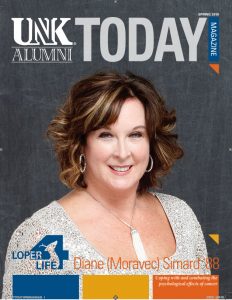 To that point, that’s why I come back and I asked God, “If I think about the fact that everything did. I continued to do yoga and trying to have less stress and to joke about things a lot and not take myself seriously.” I’ve met plenty of survivors who are ten years out as a survivor, their anxiety is getting worse. They are so freaked out about cancer recurring because they’re aging. They’re saying as I do, “Could I have gone through what I went through at age 50 at age 70?”
To that point, that’s why I come back and I asked God, “If I think about the fact that everything did. I continued to do yoga and trying to have less stress and to joke about things a lot and not take myself seriously.” I’ve met plenty of survivors who are ten years out as a survivor, their anxiety is getting worse. They are so freaked out about cancer recurring because they’re aging. They’re saying as I do, “Could I have gone through what I went through at age 50 at age 70?”
My take on that is what’s the alternative? You do what you do.
It’s perspective. There is no easy answer. I am not, “We must do this.” All I’m saying is take a look at the situation. To your point about it impacted your children at a young age. This experience because it’s so frightening in so many things. Statistically you survived cancer once, the greater the chance it’s going to recur and all those things. I was at 0% risk for cancer happening genetically because I don’t have any cancer genes but dementia and heart disease. There are tons of that. I have to remind myself that I’m not all high and mighty because I survived cancer once. I’m still eating healthy for heart disease and all that. Life is complicated and so focus on living. That’s a theme in my book is that all my life, my mother, health professionals have said, “Focus on living, celebrate your life, be grateful and all of those things.” There are things that are going to make you angry. That’s what adds color to your life. Figure out where your place is, what you can do to impact change and to be grateful because I saw so many people again who are not going to survive this. It’s heartbreaking and I live my life for them now.
I think about the book and to bring this to a close because I’ve been harassing you for a while now again. The Unlikely Gift of Breast Cancer, the title you ended up with. As you think about you’ve got your notes along the way, you went to the draft and you did all the things that you do as a journalist that you know how to do. For the person that has that book in them, but as importantly for the person too that may be trying to understand. Your book is available on Amazon and elsewhere. What advice would you have to that budding author that wants to get that book out?
It’s finding the motivating reason that will allow you to spend fifteen or five or 30 or 60 minutes every day or five hours a week or whatever it’s going to take. Figure out what it is that’s going to motivate you to want to do that. Making money is not the reason. Is there something that’s nagging you that’s unfulfilled? It is an accomplishment. Honestly, when you get that first box of books in the mail, the work is starting. Writing a book is the easy part and I’m not discouraging anybody from doing this. I did the self-publishing route. There are over 700,000 self-published books in this country alone every year. I do what I can to be my own publicist and try to bring attention.
I have wonderful friends who were helping me get Amazon reviews. That’s all important too. It’s to find that right motivation. Whatever it is going to get you out of bed at [5:30] instead of [6:00] every morning to do this because it is a process. I had thirteen revisions of this book. I hired a professional writing coach because I was trained as a journalist to report a story. That was helpful though because she held me accountable. Much like in business, figure out what it is that motivates you, those milestones, the accountability, is it going to cost you money? My writing coach told me at the end of our six-month engagement that most of her clients get one chapter written. In the six-month engagement, I got the whole first manuscript done. Figuring out what motivates you in your life and then apply that to this.
Diane, this has been a pleasure. I can’t tell you how much I appreciate you taking the time again to share your insights. For the folks out there, The Unlikely Gift of Breast Cancer, I would urge you to pick it up. You’ll find it informational and also it’s a good read. I enjoyed the book myself.
Thank you so much, Bob.
Links Mentioned:
- Diane Simard
- Diane M. Simard – Previous episode
- Bye Aerospace
- The Unlikely Gift of Breast Cancer
- Center for Oncology Psychology Excellence
- The Unlikely Gift of Breast Cancer on Amazon
- https://www.DianeMSimard.com/
- https://www.DianeMSimard.com/WP-Content/Uploads/2018/06/UNKCombinedInterview.pdf
About Diane Simard
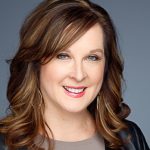 Diane is an angel investor, philanthropist, mentor, aspiring author and an advocate to bring more attention to the psychological impact of traumatic illnesses, particularly cancer. She is also Sr. Vice President of Media and Investor Relations and serves on the Board of Directors of Bye Aerospace. The aerospace engineering company is developing the “Sun Flyer” family of all-electric aircraft in addition to a family of advanced, medium-altitude, long-endurance solar-electric aircraft called “StratoAirNet” and “Solesa.”
Diane is an angel investor, philanthropist, mentor, aspiring author and an advocate to bring more attention to the psychological impact of traumatic illnesses, particularly cancer. She is also Sr. Vice President of Media and Investor Relations and serves on the Board of Directors of Bye Aerospace. The aerospace engineering company is developing the “Sun Flyer” family of all-electric aircraft in addition to a family of advanced, medium-altitude, long-endurance solar-electric aircraft called “StratoAirNet” and “Solesa.”
Near the end of her 16 chemo treatments for late Stage III breast cancer in 2015, Diane searched for a professional counselor to help her sort out her pendulum of emotions. After discussing her situation with her medical oncologist, health professionals and other survivors, she discovered there are very few professionals who specialize in helping a business executive like herself make sense of her experience. So, at her one-year anniversary as a survivor, Diane founded the Center for Oncology Psychology Excellence (COPE) at the University of Denver’s Graduate School of Professional Psychology, the first specialty program in the country to offer graduate-level coursework in psychosocial oncology to clinical psychology students. She has published a book about her cancer experience that inspired her to launch COPE, is a national speaker on women in business, survivorship and philanthropy, and advocates for individualized psychosocial support for cancer survivors and their caregivers.
Love the show? Subscribe, rate, review, and share!
Join the Business Leaders Podcast Community today:
- businessleaderspodcast.com
- Business Leaders Facebook
- Business Leaders Twitter
- Business Leader LinkedIn
- Business Leaders YouTube
The post The Unlikely Gift Of Breast Cancer with Diane Simard appeared first on My podcast website.